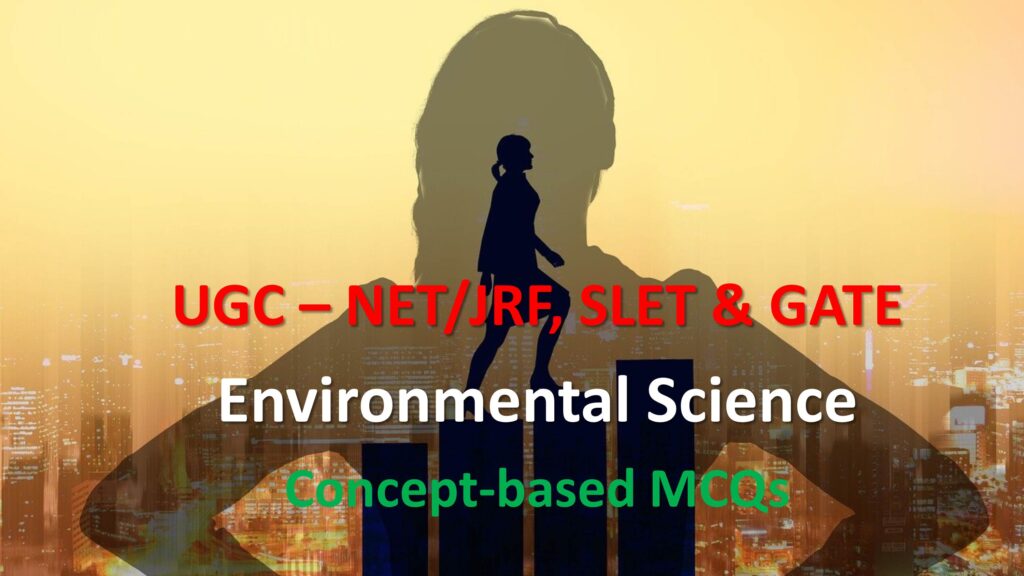
Welcome to the COMPETITIVE EXAM MCQs SERIES of ENVIRONMENTAL SCIENCE for UGC-NET/JRF, SLET, ARS, GATE, and other entrance tests.
Concept-based important MCQs are primarily based on the syllabus of UGC-NET/JRF, SLET, and GATE ENVIRONMENTAL SCIENCE. Each chapter contains 25 MCQs with a single correct answer.
Unit-1: Fundamentals of Environmental Sciences
- Structure and Composition of the Atmosphere
- Laws of thermodynamics
- Meteorological parameters
- Interaction between Earth, Humans and Environment
- Resources and their assessment
- Bio-geographic provinces of the world
- Agro-climatic zones of India
- Principles of Remote Sensing and GIS
- Environmental education and awareness
- Environmental ethics
- Concept of sustainable development
Unit-2: Environmental Chemistry
- Fundamentals of Environmental Chemistry
- Composition of air
- Chemical speciation
- Hydrological cycle
- Water as a universal solvent
- Inorganic and organic components of soils
- Biogeochemical cycles
- Toxic chemicals
- Airborne Carcinogens
- Principles of Analytical Methods
Unit-3: Environmental Biology
- Fundamentals of Ecology
- Origin of life and speciation
- Ecosystem Structure and Functions
- Ecological Succession and Species Diversity
- Basis of Ecosystem Classification & Biomes
- Population ecology
- Community ecology
- Biodiversity and its conservation
- Concept of Industrial Ecology
- Environmental Biotechnology
Unit-4: Environmental Geosciences
- Origin of Earth
- Concept of Minerals and Rocks
- Geophysical Fields
- Weathering
- Identification and Characterization of Clay Minerals
- Earth’s Thermal Environment and Seasons
- Geochemical Classification of Elements
- Hydrogeology and Hydrology
- Natural Resources Exploration and Exploitation
- Natural Hazards
Unit-5: Energy and Environment
- Solar Energy and Environmental Resilience
- Fossil Fuels and Environmental Costs
- Shale Oil, Coal Bed Methane and Gas Hydrates
- Hydropower, Tidal and Thermal Energy
- Nuclear Fission and Fusion Energy
- Nuclear Reactors and Environmental Harmony
- Biomass and Bioenergy
- Environmental Implications of Energy Use
- Exploitation of Renewable Energy Resources
Unit-6: Environmental Pollution and Control
- Air Pollution and Control
- Sampling and Monitoring of Air Pollutants
- Noise Pollution and Control
- Water Pollution and Control
- Measurement of Water Quality Parameters
- Drinking Water Treatment
- Analysis of Soil Quality
- Soil Microorganisms and their Functions
- Radioactive, Thermal and Marine Pollution
Unit-7: Solid and Hazardous Waste Management
- Characterization of Solid and Hazardous Waste
- Solid Waste Collection and Transportation
- Solid Waste Processing and Recovery
- Electrical Energy from Solid Waste
- Disposal of Solid and Hazardous Waste
- Hazardous Waste Management
- Electronic Waste Management
- Sources and Management of Fly Ash
- Sources and Management of Plastic Waste
Unit-8: Environmental Assessment, Management, and Legislation
- Environmental Impact Assessment and Statement
- Environmental Management Plan
- Environmental Management System
- Risk Assessment and Management
- Environmental Laws in India
- National Forest Policy and Governance in India
- National Water Policy and Its Implementation in India
- National Environmental Policy of India
- Environmental Conventions and Agreements
- Environmental Governance by International Institutions: IPCC, UNEP, and IGBP
Unit-9: Statistical Approaches and Modelling in Environmental Sciences
- Environmental Statistical Approaches for Attributes and Variables
- Measurement of Central Tendency and Dispersion
- Skewness and Kurtosis with Statistical Moments
- Concepts of Probability Theory
- Environmental Statistics and Sampling Theory
- Applied Statistical Distributions
- Statistical Significance and Confidence Limits
- Approaches to the Development of Environmental Models
- Models of Population Growth and Interactions
Unit-10: Contemporary Environmental Issues
- Global Environmental Issues
- National Action Plan on Climate Change
- International Efforts for Environmental Protection
- Environmental Issues Related to Water Resource Projects
- Water Conservation- Development of watersheds
- Rainwater harvesting and Groundwater recharge
- National River Conservation Plan
- Climate change and global warming
- Forest Conservation and wildlife conservation projects
- Environmental Challenges of Waste Management
- Environmental Disasters and Their Management
Disclaimer
The questions in this MCQ practice set are designed to foster a fundamental understanding of key concepts and provide practice. It’s essential to note that answers may vary depending on contextual factors, time constraints, and individual interpretation. Furthermore, occasional inaccuracies in answer key marking can occur due to human error. Thus, it is advisable to cross-verify your responses with a trusted textbook or reference source. The authors of this practice set cannot be held liable for any discrepancies or errors.